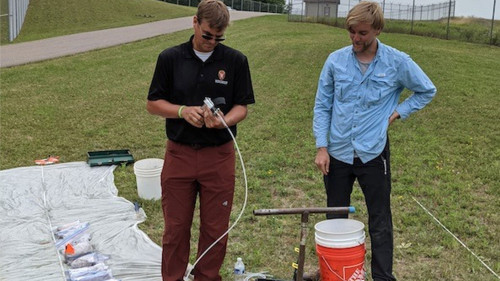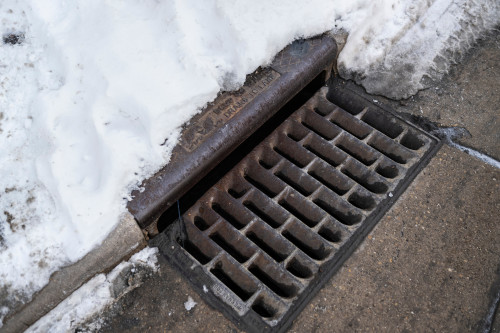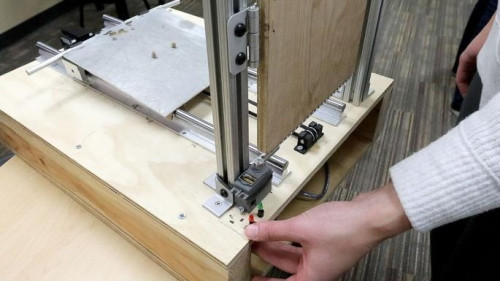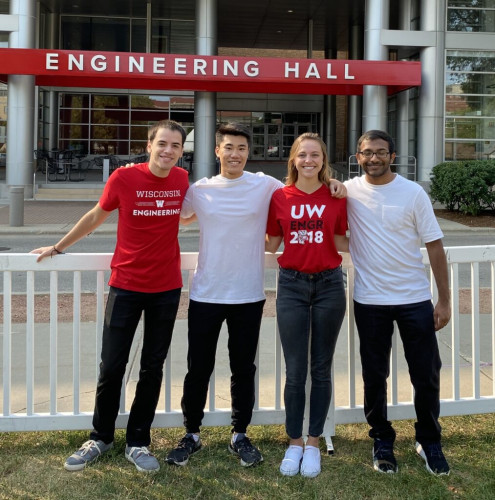Meet the engineers making a difference in Wisconsin communities
When it comes to helping Wisconsin residents and the state’s economy, you Can’t Stop a Badger. See how UW–Madison scientists conduct cutting-edge research that delivers tangible benefits for Wisconsinites and the world. Follow along using #CantStopABadger on social media. Your support can help us continue this work.
Even before they graduate, University of Wisconsin–Madison engineers contribute their expertise to public and private clients around the state in ways that improve lives, protect natural resources and save money. Students gain hands-on experience working with local governments and manufacturers as they tackle real-world problems.
From Rhinelander to Trempealeau County and Cottage Grove, here are just a few examples of UW–Madison College of Engineering students and faculty stepping up to provide Wisconsin communities and businesses with expert information and tangible benefits — benefits that could be multiplied in the future with a new, state-of-the-art engineering building to support expanded programs and a larger pipeline of Badger engineers.
Protecting Rhinelander’s water supply

CEE Associate Professor Jim Tinjum, left, talks to graduate student Elliot Draxler during field work in Rhinelander. Tinjum and Draxler were collecting groundwater samples using a suction lysimeter near the Rhinelander-Oneida County Airport.
Rhinelander is one of many municipalities in Wisconsin grappling with a water supply contaminated with per- and polyfluoroalkyl substances, or PFAS, known as “forever chemicals” because they can persist indefinitely in the environment. PFAS are synthetic chemicals associated with health risks, and in 2019, the city shut down two of its wells due to unsafe PFAS levels.
James Tinjum and Dante Fratta, both associate professors of civil and environmental engineering, have worked closely with officials in Rhinelander as they track PFAS contamination in the city’s water and search for ways to clean it up.
Together with Christopher Zahasky, an assistant professor of geoscience, and a team of students, the engineers are mapping the region’s water table and developing actionable solutions that would keep the city’s water supply safe. Read more.
Designing adaptive gym equipment

Biomedical engineering undergraduate students Josh Andreatta, Annabel Frake, Tim Tran, Samuel Skirpan and Roxi Reuter have taken a standard rowing machine and modified it so that it’s easily convertible for users in wheelchairs.
Over the course of several semesters, students in the Department of Biomedical Engineering’s undergraduate design program have been working with Johnson Health Tech, a fitness manufacturer in Cottage Grove, to design gym equipment that works for users with different physical abilities and limitations.
Specifically, the students have designed and built a prototype for a rowing machine that’s easily convertible for wheelchair users. A couple adaptive rowing machines are already on the market, but they don’t convert to a standard setup. The undergrads spent the spring 2023 semester fine-tuning their prototype to make it more practical to manufacture on a large scale — a key consideration for creating a marketable piece of equipment. Read more.
Optimizing salt use on winter roads

Reducing road salt usage can help keep salt out of Wisconsin’s lakes and streams. Researchers at UW’s Traffic Operations and Safety lab have found liquid brine cleared the state’s highways faster, provided better friction on roadways and reduced overall salt usage. Photo: Jeff Miller
Wisconsin is water-rich, and for half the year it’s freezing — a difficult combination for policymakers trying to keep winter motorists safe while protecting water quality. That’s because road salt, while a useful tool for melting snow and ice on highways, can wreak havoc on aquatic ecosystems when it washes into streams and lakes.
During the 2020-2021 winter season, researchers at UW–Madison’s Traffic Operations and Safety (TOPS) lab, housed in the College of Engineering, performed an in-depth analysis of salt use in 10 counties around the state. They concluded that liquid brine clears roads faster than traditional rock salt. Brine also reduces overall salt use by an average of 23%, according to the engineers — a potential source of cost savings for counties and municipalities and a clear win for cleaner water. Read more.
Making a favorite summer pastime more accessible

UW engineering students worked with Mercury Marine in Fond du Lac to design a more accessible boat ramp. The prototype is essentially a height-adjustable ramp that can be used to get into a boat, combined with a door that opens in both directions.
Public boat ramps provide easy access to many of Wisconsin’s 15,000 lakes. But the ramps can be difficult or impossible to use for people with mobility issues, including the elderly and wheelchair users.
Working with Fond du Lac-based Mercury Marine, a group of UW–Madison engineering students designed a prototype for a remote-controlled ramp that could help users with mobility limitations better access a favorite summer pastime in Wisconsin.
Members of the university’s chapter of Society of Women Engineers placed third in a national competition with their accessible boat ramp design. Read more.
Designing improvements for a unique Wisconsin manufacturer

Students Armando Miracola, Kevin Chang, Reagan Hubbard and Rushi Patel applied their engineering skills to benefit Cardinal Manufacturing, a unique tech ed program at Eleva-Strum High School.
UW–Madison mechanical engineering students came to the aid of a unique manufacturer in Strum, a village of about 1,000 in Trempealeau County.
As part of their senior design program, the student engineers worked with Cardinal Manufacturing, a company run by tech-ed students at Eleva-Strum High School that provides woodworking, welding, metalworking and other services in the region.
Cardinal sought to professionalize the appearance of its facilities, and UW–Madison engineers designed a custom gate and fence system to enclose its dumpsters and recycling bins. The design needed to be both functional and decorative, which provided students with a technical challenge as they also gained experience working with clients with unique needs and expectations. Read more.
Rethinking county government buildings
Through partnerships with UW–Madison’s UniverCity Alliance program, civil and environmental engineering students helped officials in two Wisconsin counties plan for their future facility needs.
In Adams County, students performed an analysis of the county’s aging health and human services building, which is not an ideal space for meeting patients’ needs. County officials are planning to build a new facility and asked the students to analyze the feasibility of repurposing the current facility for different uses. The students analyzed three possible scenarios from a technical design perspective and submitted a report to the county to inform its planning.
Civil and environmental engineering students also aided Marathon County in its effort to streamline services and consolidate offices. Like in Adams County, students performed an analysis of the county’s physical spaces while also consulting with local officials and a countywide public survey. They ultimately submitted a report for the county to use as it plans its future. Read more.
Subscribe to Wisconsin Ideas
Want more stories of the Wisconsin Idea in action? Sign-up for our monthly e-newsletter highlighting how Badgers are taking their education and research beyond the boundaries of the classroom to improve lives.
Tags: The Wisconsin Idea
